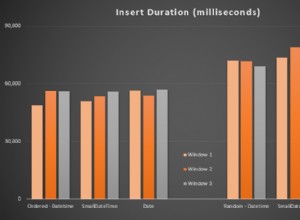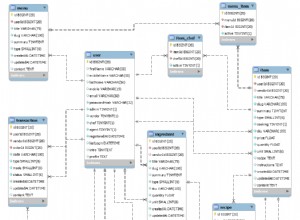Domyślam się, że ThreadPoolExecutor to nie jest to, co tworzy połączenie DB, ale zadania wątkowe to te, które utrzymują połączenie. Miałem już z tym do czynienia.
Skończyło się na zbudowaniu tego opakowania, aby upewnić się, że wątki są zamykane ręcznie, gdy zadania są wykonywane w ThreadPoolExecutor. Powinno to być przydatne w zapewnieniu, że połączenia nie są przeciekające, jak dotąd nie zauważyłem żadnego wycieku podczas korzystania z tego kodu.
from functools import wraps
from concurrent.futures import ThreadPoolExecutor
from django.db import connection
class DjangoConnectionThreadPoolExecutor(ThreadPoolExecutor):
"""
When a function is passed into the ThreadPoolExecutor via either submit() or map(),
this will wrap the function, and make sure that close_django_db_connection() is called
inside the thread when it's finished so Django doesn't leak DB connections.
Since map() calls submit(), only submit() needs to be overwritten.
"""
def close_django_db_connection(self):
connection.close()
def generate_thread_closing_wrapper(self, fn):
@wraps(fn)
def new_func(*args, **kwargs):
try:
return fn(*args, **kwargs)
finally:
self.close_django_db_connection()
return new_func
def submit(*args, **kwargs):
"""
I took the args filtering/unpacking logic from
https://github.com/python/cpython/blob/3.7/Lib/concurrent/futures/thread.py
so I can properly get the function object the same way it was done there.
"""
if len(args) >= 2:
self, fn, *args = args
fn = self.generate_thread_closing_wrapper(fn=fn)
elif not args:
raise TypeError("descriptor 'submit' of 'ThreadPoolExecutor' object "
"needs an argument")
elif 'fn' in kwargs:
fn = self.generate_thread_closing_wrapper(fn=kwargs.pop('fn'))
self, *args = args
return super(self.__class__, self).submit(fn, *args, **kwargs)
Wtedy możesz po prostu użyć tego:
with DjangoConnectionThreadPoolExecutor(max_workers=15) as executor:
results = list(executor.map(func, args_list))
...i miej pewność, że połączenia zostaną zamknięte.




